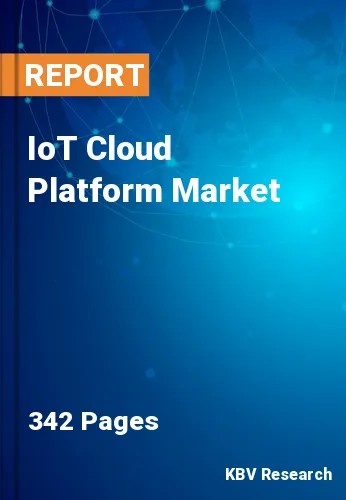The Global IoT Cloud Platform Market size is expected to reach $39.8 billion by 2028, rising at a market growth of 14.6% CAGR during the forecast period.
A network of actual physical objects that are outfitted with software, sensors, and other technologies in order to connect and exchange data with other systems and devices through the internet is known as the Internet of Things (IoT). IoT technology encompasses web-connected smart devices that collect data from their surroundings and use embedded systems made up of sensors, processors, and communication gear to receive, process, and store information.
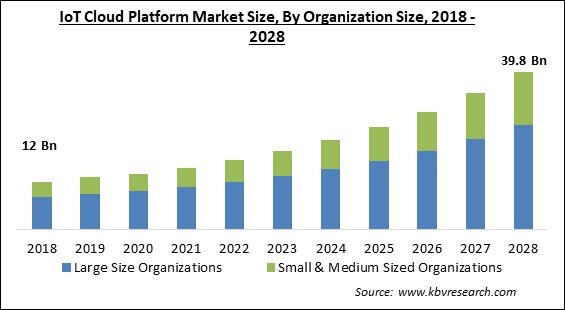
Businesses across a wide range of industries are gradually embracing IoT technology to improve organizational performance and better understand their customers so they can provide better, more individualized customer care, make smarter decisions, and increase the value of their company.
The adoption of IoT cloud platforms is increasing due to factors like development of advanced data analytics, the improvement in cloud platform usage, the upgrading of wireless networking technologies, and the falling cost of connected devices. The internet of things is always in favor when it comes to tying together various smart gadgets to simplify operations and data sharing among themselves.
Numerous smart devices, including smartphones, sensors, and wearables, collect pertinent data from the devices that are then used to speed up the client experience. Over the course of the projection period, it is predicted that the IoT cloud platform market would see increased demand due to the growing need for data analysis and analytics integration.
Numerous business environment sectors were impacted by the COVID-19 pandemic. This is attributed to a sharp increase in demand for cloud based IoT solutions, which continued to be essential for businesses to thrive during the pandemic. The relaxation of lockdown and mobility restrictions in public spaces by governments across many nations induced a gain in income, which demonstrated that the negative effects of pandemic on the supply chain have been outweighed by the deployment of IoT. For the past few months, many businesses have made work from home the routine, and wherever practicable, this trend will continue. More flexibility is offered by IoT cloud platforms, businesses can save money on physical places and collaborate across geographical boundaries. Therefore, the pandemic had a positive impact on the IoT cloud platform market.
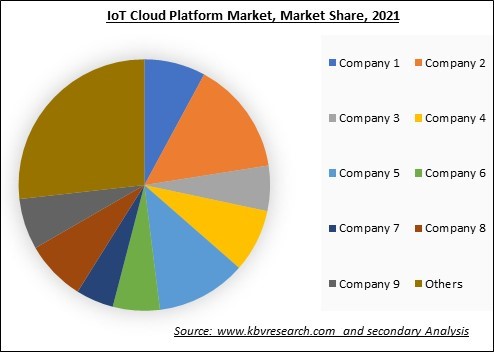
The leading players in the market are competing with diverse innovative offerings to remain competitive in the market. The below illustration shows the percentage of revenue shared by some of the leading companies in the market. The leading players of the market are adopting various strategies in order to cater demand coming from the different industries. The key developmental strategies in the market are Partnerships & Collaborations.
Networked technologies including IoT devices and edge computing are becoming increasingly well-liked on the market as a result of their numerous high-throughput and productivity-boosting applications. The production of IoT devices by a wide range of vendors is another factor that is accelerating the proliferation of connected devices in the modern business environment. A few examples of typical technologies and protocols used by IoT systems include radiofrequency identification (RFID), near-field communication (NFC), low-energy Bluetooth, low-energy wireless, low-energy radio protocols, LTE-A, and Wi-Fi-direct. Thus, propel the growth of the IoT cloud platform market.
The demand for IoT devices will rise as the world becomes more urbanized, as will the number of smart city initiatives and government funding for the digital economy. In order to improve infrastructure, public services, and utilities, the platform and devices are used to keep a careful eye on mobility, infrastructures, and air and water quality. Organizations have good opportunity to obtain the necessary data, such as consumer behavior in retail stores, for real-time marketing research, sensor-driven decision analytics, and fast control response in complex autonomous systems owing to internet connectivity and linked devices. Therefore, the growing efforts of transforming cities into smart cities are expediting the expansion of the IoT cloud platform market.
User’s sensitive and private information may be collected by the IoT cloud platform. The cloud platform stores biometric data, organizational data, and customer records. Additionally, networked devices are crucial to the IoT cloud platform. These elements may increase the likelihood of a data breach. Any firm may experience revenue losses as a result of data breaches. The growing number of data breaches on cloud platforms is a serious problem. It is a critical factor that might prevent many sectors from adopting IoT cloud platforms, which is disadvantageous for the market.
Based on offering, the IoT cloud platform market is categorized into platform (without services) and services. The services segment recorded a significant revenue share in the IoT cloud platform market in 2021. The requirement for IoT cloud services to conduct remote maintenance tasks and track the health of the company network and infrastructure is driving the segment's expansion. The majority of the building blocks of an IoT ecosystem needs are provided by service platforms. With service provider, users don't need to be concerned with the underlying server hardware.
On the basis of deployment type, the IoT cloud platform market is divided into commercial, private, and hybrid. The commercial segment procured the highest revenue share in the IoT cloud platform market in 2021. A large part of the commercial segment's expansion can be ascribed to elements like simple deployment, adaptability, and affordable pricing. The increasing demand for commercial clouds is also being fueled by rising investments in public cloud infrastructure and an industry-wide digital transformation that is accelerating. Furthermore, the widespread use of mobile devices and the internet also increase the accessibility of cloud platforms.
Based on organization size, the IoT cloud platform market is segmented into small & medium sized organizations and large size organizations. The large size organizations segment recorded the largest revenue share in the IoT cloud platform market in 2021. To effectively manage their corporate operations, large-size enterprises are actively investing in the integration of IoT devices with cloud platforms. The expansion of the segment is being fueled by the increasing number of operational IoT devices throughout large companies. Customers of large-sized enterprises utilize IoT to uncover fresh insights from massively diversified data sets made up of both historical and current data.
On the basis of application, the IoT cloud platform market is fragmented into industrial automation & smart manufacturing, smart infrastructure, automotive, healthcare, retail & e-commerce, BFSI, and others. The healthcare segment procured a significant revenue share in the IoT cloud platform market in 2021. The adoption of IoT cloud platforms in healthcare applications is anticipated to rise as a result of factors including the rising acceptance of embedded sensors, the increased utilization of wireless devices, as well as the quick development of healthcare IT. This is propelling the growth of the segment. As a result, healthcare institutions are putting a lot of effort into adopting reliable apps and connected technology.
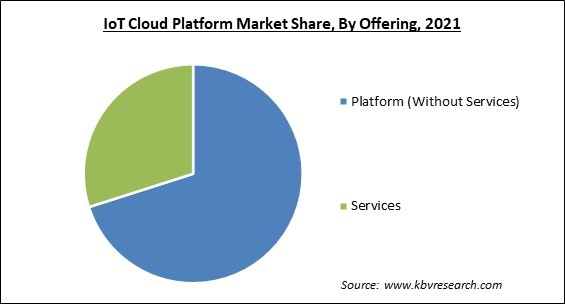
| Report Attribute | Details |
|---|---|
| Market size value in 2021 | USD 15.6 Billion |
| Market size forecast in 2028 | USD 39.8 Billion |
| Base Year | 2021 |
| Historical Period | 2018 to 2020 |
| Forecast Period | 2022 to 2028 |
| Revenue Growth Rate | CAGR of 14.6% from 2022 to 2028 |
| Number of Pages | 342 |
| Number of Tables | 553 |
| Report coverage | Market Trends, Revenue Estimation and Forecast, Segmentation Analysis, Regional and Country Breakdown, Competitive Landscape, Market Share Analysis, Companies Strategic Developments, Company Profiling |
| Segments covered | Offering, Deployment Type, Organization Size, Application, Region |
| Country scope | US, Canada, Mexico, Germany, UK, France, Russia, Spain, Italy, China, Japan, India, South Korea, Singapore, Malaysia, Brazil, Argentina, UAE, Saudi Arabia, South Africa, Nigeria |
| Growth Drivers |
|
| Restraints |
|
Based on region, the IoT cloud platform market is analyzed across North America, Europe, Asia Pacific, and LAMEA. The North America segment recorded the highest revenue share in the IoT cloud platform market in 2021. The development of the IoT cloud platform in the region is being fueled by the spread of IoT-enabled devices, rising adoption of technologies like industry 4.0, edge computing, and cloud. The rising R&D investments in the IoT sector and the presence of significant market players like Google, IBM, and Microsoft are also propelling the incorporation of these advanced technologies.
Free Valuable Insights: Global IoT Cloud Platform Market size to reach USD 39.8 Billion by 2028
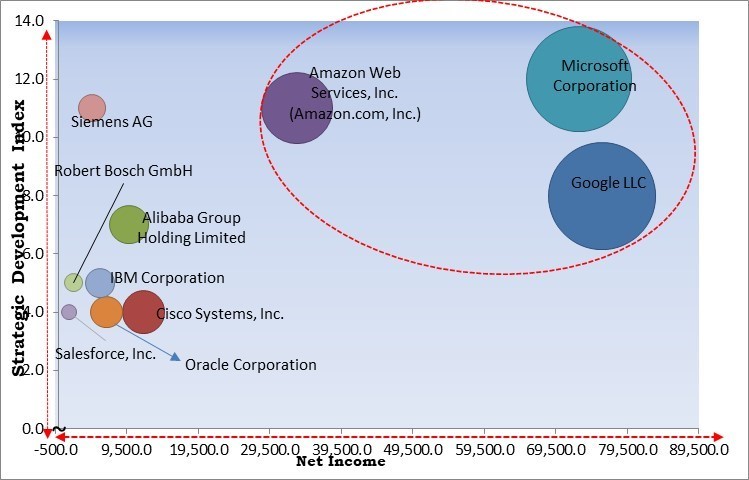
The major strategies followed by the market participants are Partnerships. Based on the Analysis presented in the Cardinal matrix; Microsoft Corporation, Google LLC, Amazon Web Services, Inc. (Amazon.com, Inc.) are the forerunners in the IoT Cloud Platform Market. Companies such as Cisco Systems, Inc., Alibaba Group Holding Limited, and Siemens AG are some of the key innovators in IoT Cloud Platform Market.
The market research report covers the analysis of key stake holders of the market. Key companies profiled in the report include Amazon Web Services, Inc. (Amazon.com, Inc.), Microsoft Corporation, Google LLC, Cisco Systems, Inc., IBM Corporation, Oracle Corporation, Salesforce, Inc., Siemens AG, Alibaba Group Holding Limited, and Robert Bosch GmbH.
By Application
By Organization Size
By Offering
By Deployment Type
By Geography
The global IoT Cloud Platform Market size is expected to reach $39.8 billion by 2028.
IoT applications in the banking sector are growing which is driving the market in coming years, however, Higher probability of data breaches and security issues restraints the growth of the market.
Amazon Web Services, Inc. (Amazon.com, Inc.), Microsoft Corporation, Google LLC, Cisco Systems, Inc., IBM Corporation, Oracle Corporation, Salesforce, Inc., Siemens AG, Alibaba Group Holding Limited, and Robert Bosch GmbH.
The Industrial Automation & Smart Manufacturing segment acquired maximum revenue share in the Global IoT Cloud Platform Market by Application in 2021 thereby, achieving a market value of $8.7 billion by 2028.
The Platform (Without Services) segment is leading the Global IoT Cloud Platform Market by Offering in 2021 thereby, achieving a market value of $27.4 billion by 2028.
The North America market dominated the Global IoT Cloud Platform Market by Region in 2021, and would continue to be a dominant market till 2028; thereby, achieving a market value of $14.1 billion by 2028.
Our team of dedicated experts can provide you with attractive expansion opportunities for your business.
